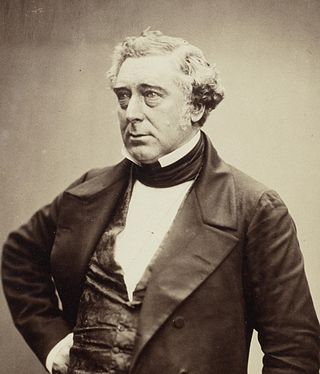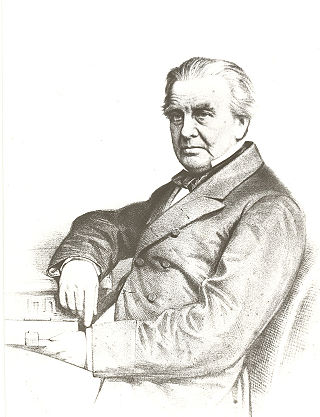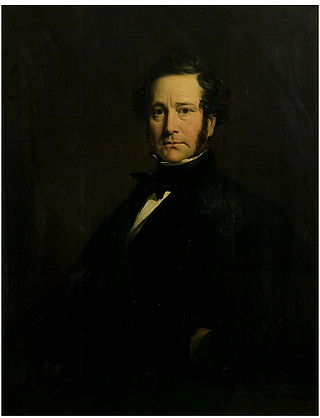Related Research Articles

George Stephenson was an English civil engineer and mechanical engineer during the Industrial Revolution. Renowned as the "Father of Railways", Stephenson was considered by the Victorians as a great example of diligent application and thirst for improvement. His chosen rail gauge, sometimes called "Stephenson gauge", was the basis for the 4-foot-8+1⁄2-inch (1.435 m) standard gauge used by most of the world's railways.

Robert Stephenson, DCL was an English civil engineer and designer of locomotives. The only son of George Stephenson, the "Father of Railways", he built on the achievements of his father. Robert has been called the greatest engineer of the 19th century. Stephenson's death was widely mourned, and his funeral afforded marks of public honour. He is buried in Westminster Abbey.

Earl Howe is a title that has been created twice in British history, for members of the Howe and Curzon-Howe family respectively. The first creation, in the Peerage of Great Britain, was in 1788 for Richard Howe, 4th Viscount Howe, but it became extinct upon his death in 1799. The second creation, in the Peerage of the United Kingdom, was in 1821 for Richard Curzon-Howe, 2nd Viscount Curzon, and it remains extant.

Sir John Rennie FRSA was the second son of engineer John Rennie the Elder, and brother of George Rennie.

Welbore Ellis, 1st Baron Mendip, PC, FRS was a British politician who sat in the House of Commons for 53 years from 1741 to 1794 when he was raised to the peerage as Baron Mendip. He held a number of political offices, including briefly serving as Secretary for the Colonies in 1782 during the American War of Independence.
John Martin may refer to:
John Stephenson may refer to:

Captain Sir Andrew Snape Hamond, 1st Baronet was a British naval officer and Lieutenant Governor of Nova Scotia from 1781 to 1782 and Comptroller of the Navy from 1794 to 1828.

Charles Blacker Vignoles was an influential British railway engineer, and eponym of the Vignoles rail.
Sir George Henry Rose GCH was a British politician and diplomat.
General John Lambton of Harraton Hall, later of Lambton Castle, County Durham, was a senior officer in the British Army and a Member of Parliament.

Sir Henry Frederick Stephenson was a Royal Navy officer, courtier, and Arctic explorer.

Benjamin Vaughan MD FRSE LLD was a British political radical. He was a commissioner in the negotiations between Britain and the United States at the drafting of the Treaty of Paris.

Andrew George Stephenson is a British politician serving as Minister of State for Health and Secondary Care since November 2023. A member of the Conservative Party, he has been the Member of Parliament (MP) for Pendle in Lancashire since 2010.

What Every Woman Knows is a 1934 American romantic comedy film directed by Gregory La Cava and starring Helen Hayes, Brian Aherne and Madge Evans. The film was produced and distributed by Metro-Goldwyn-Mayer and is based on the play What Every Woman Knows (1908) by J. M. Barrie. It was filmed by Paramount back in the silent era in 1921 and stars Lois Wilson. An even earlier British silent version was filmed in 1917. Hayes was familiar with the material as she had starred in a 1926 Broadway revival opposite Kenneth MacKenna.

Sir Joshua Walmsley (1794–1871) was an English businessman and Liberal Party politician.
John Norman MacLeod was a British politician who sat in the House of Commons from 1828 to 1830. He was the 24th Chief of Clan MacLeod.
Rowland Stephenson was a British banker and politician who precipitated the collapse of a bank and took refuge in America.

General Sir Charles Hotham-Thompson, 8th Baronet was a British Army officer and Member of Parliament.
Captain John Rodney was a British naval officer, politician, serving as the member of parliament for Launceston (1790–1796) and public servant, serving as the third Colonial Secretary of Ceylon (1806–1833).
References
- ↑ "STEPHENSON, John (1710-94), of Brentford Butts, Mdx". History of Parliament Online. Retrieved 14 February 2018.
- ↑ Greene, Jack P. (July 1975). "Social Structure and Political Behavior in Revolutionary America: John Day's Remarks on American Affairs". The William and Mary Quarterly . 3rd Ser. 32 (3): 487. doi:10.2307/1922136. JSTOR 1922136.